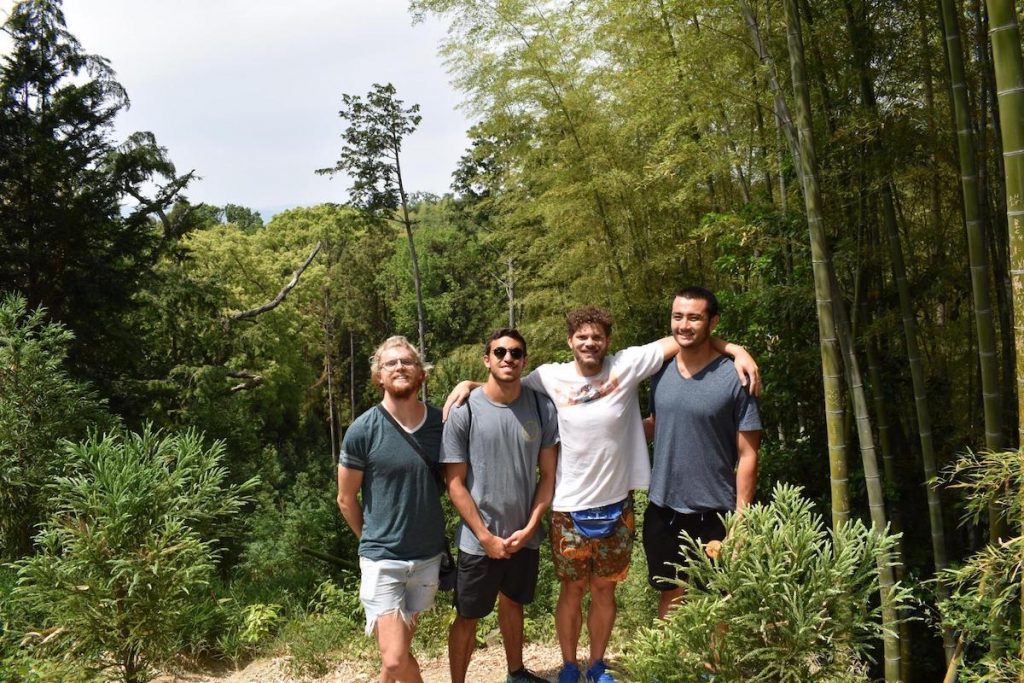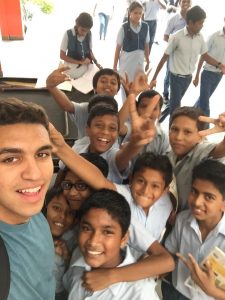
Duke 2019 alum and former member of the Duke Men’s Swimming and Diving team, Judd Howard reflects on his experience five years later participating in the ACE in India 2017 program. Howard shares how becoming immersed in Indian culture encouraged him to take more risks and work towards a career that aligns his passions with his work ethic. Howard also remembers some of the meaningful relationships he made with local community members at the athletic club in New Delhi where he swam and the children he taught and coached at the Vidya School.
What are you doing now? How did ACE influence your career?
I recently joined an early-stage technology startup doing work with small businesses around the country. I was pointed toward entrepreneurial pursuits early in my career by a combination of influences throughout my studies at Duke, time in athletics, and my ACE in India experience. Through 20+ hour/week of training and athletic commitments, I learned the importance of effort, training, and keeping a meticulous schedule. As a member of Duke’s Innovation & Entrepreneurship program, I was introduced to the startup ecosystem and different methodologies around problem-solving, always looking for a problem before a solution. I was ready to jump into a career in finance or banking and work hard.
Then, during my time in India, that plan was turned upside-down, and for the better. It was tough to be in Delhi at times. The variety of unfamiliar colors, smells, noises were often overwhelming up through my final day in the country. Beneath all the relative chaos and confusion is a culture ingrained with change-makers. Though hard to spot at first, about 2/3 of the way into my trip I couldn’t notice anything else, and it completely changed the way I thought about my future and my long-term goals.
“In fact, I left my previous job in the height of the pandemic to pursue something more in-line with my values and the goals I had coming out of the ACE program.”
– Judd Howard, ACE in India 2017
After the trip, I knew I didn’t want to go the traditional route with my career. I knew it was important that I look for problems and solutions simultaneously, rather than sequentially. I knew working with technology and taking big risks were important to me. I knew that the intersection of passion and work ethic is where real impact happens. I knew that you can’t always plan for external pressure, but you can always use it to your advantage.
I’m more likely to take risks in my career. In fact, I left my previous job in the height of the pandemic to pursue something more in-line with my values and the goals I had coming out of the ACE program. That risk ended up landing me on my path today, and I don’t think I would have been comfortable with the months of uncertainty had I not seen firsthand the upside of uncertainty during my time in Delhi.
More directly, in my role today, I get to work directly with a team of engineers and web-developers in India. They’re organized and disorganized, on their own schedule but efficient with deadlines and requests to the point where they almost anticipate what problem needs solving before it comes up. Although it’s a much different working with this group versus the dozens of students I interacted with at ACE, it’s impressive to see the same values and problem-solving culture that left an impact on me during the program. I’m reminded of the impact the experience had on me, and glad that ACE started the path that led to this point in my career.
What was the most meaningful part of your ACE experience?
I left with an immense appreciation and gratitude for my place as a student-athlete in the US, and how uniquely lucky I am to have had that experience. At Duke, we had access to the best staff, facilities, and training conditions that enabled us to perform at our best. The school we worked at had about the same athletic facilities as any elementary school in the US, and the athletic club we trained at in the mornings was analogous to your standard YMCA, but the real impact came from interacting with the people in both of these places. Men and women on Duke Swim practiced and trained together.
At Vidya School, typically it was only the boys playing soccer, cricket, volleyball, basketball, etc. with the girls sitting around the field. It took us almost half the trip to get everyone on board with being active and playing sports on their breaks. A cultural difference, but something I hadn’t given a second thought before my time in India. I couldn’t imagine an athletic career where it was only the boys training and competing, and it meant that much more to me that I got to train with everyone back at home.
We also made meaningful connections at the local athletic club. Three of us would swim in the mornings, and quickly befriended a group of Indian swimmers doing the same. We did more chatting with them between laps than actually swimming, and they treated us to a nice breakfast on our last weekend of the trip. The impact came from these relationships. The locals could not have been more complementary of our swimming technique, asking for tips and bragging to the others whenever they swam in our lanes. That club didn’t get many foreign visitors, any we were treated almost as if we were professionals.
It was a reverence I hadn’t experienced even after some of my greatest athletic accomplishments in competition. The complements and gratitude they had for us just visiting and swimming with them left a lasting impact on me and how much I valued being a student-athlete. I came back to Duke for my last two years and made sure to cherish every lasting moment I had in athletics, knowing that it was a globally-unique experience that I was beyond lucky to have been afforded.
Share a lesson you learned from your ACE experience that still holds true today:
I realized that pressures resulting from differences in culture and circumstance can create exceptional work-ethic, forward-thinking and confidence, no matter where you’re from or what situation you find yourself in. Not only did I broaden my understanding of socioeconomic and political issues facing India during my time there, but I was also inspired by the culture of problem solving, risk-taking, and innovation that I came to know during my trip. Many of the students asked about my studies at Duke, following up with two or three questions for every answer I gave.
One of my sixth-grade students and I spoke at length about economics, my major, after class one day. A ninth-grade boy asked me a question about Bitcoin, and when I could not come up with an answer, he proceeded to explain the way cryptocurrency works to me in detail for almost 10 minutes. A few of the soon-to-be graduates of the school asked us about life in American colleges, each of them certain they’d be attending someday soon.
For students whose parents had little-to-no formal education, the value they placed on school and how it can lead to major change and innovation in the future was admirable. They were extremely eager to learn and to use their knowledge to help those around them. That drive stemmed from their individual desire to expand horizons and improve the lives of themselves and their friends and families. They were aware of the problems that were most in need of solving, certain in their ability to address them with the opportunities and knowledge afforded through education.
“Not only did I broaden my understanding of socioeconomic and political issues facing India during my time there, but I was also inspired by the culture of problem solving, risk-taking, and innovation that I came to know during my trip.”
– Judd Howard, ACE in India 2017
By and large, India is a place of contradictions; we were told this by many of the guest speakers throughout the three weeks in Delhi. However, I did not really understand what they meant until I reflected more on my time there. It is a country full of innovators, yet it values the way things have been done for millennia. It is a country on the verge of massive economic development and modernization, but poverty and public-health issues remain apparent. It is a world-leader in science, math and technology, yet 80 percent of the population still leads an agrarian lifestyle.
Above all, India is an extremely unique, vibrant, diverse country and trying to define it in one way is simply not possible. India is the embodiment of ‘pressure makes diamonds’. I believe it taught me to that whatever challenges arise from external circumstance also come with opportunities to grow, learn, improve, and redirect towards a better future.
Share a fun memory from ACE:
We got to join in on our students’ dance class one day at school. Every time the music started and we began following the different steps, the kids would stop and turn one-by-one, laughing at us until eventually the laughter was louder than the music. I didn’t think we did too bad, but at least we were entertaining!
Describe your ACE experience in as few words as possible:
Immersive, impactful, engaging, and fun
What’s one thing you want people to know about ACE?
ACE is unlike anything else you can experience through collegiate athletics. The opportunity to learn about a culture, engage with the community, do impactful work, and meet other athletes who are passionate about civic engagement and service can’t be passed up or overvalued. There is nothing like this program out there, and I’m extremely lucky to have been able to participate.
What’s your hope for the future of ACE?
I’m excited to see how the program changes once students are able to travel on-site again. The ACE in Place program looked like an amazing learning opportunity in the face of Covid-19 restrictions, and I’m excited to see how combining aspects of that programming with future ACE trips will look like going forward. Also, with the ACE community growing every year, it will be nice to see how alumni are able to connect and get involved even after their time at school wraps up.
“To future participants, don’t go in with any expectations, but go in with goals.”
– Judd Howard, ACE in India 2017
What advice do you have for future ACE participants?
To future participants, don’t go in with any expectations, but go in with goals. Let the experience guide your impact, both on the people you work with and on your own mindset. It will be one of the most memorable, challenging, and important experiences of your life

